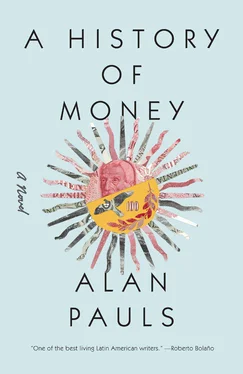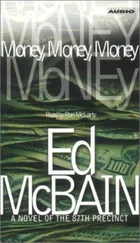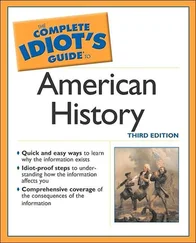It’s impossible to keep up. Nobody is fast enough. When construction work begins, the largest banknote in circulation is a thousand pesos, and to try to get change from one is a true odyssey. By the time it’s finished eleven months later, there are already five- and ten-thousand-peso bills going around, reigning like monarchs, young, distant, and untouchable, and then four weeks later, when they’re as common as the commoners over which they once reigned, they disappear without fanfare in the purchase of a few basic items. You can’t even name amounts without getting something wrong. There’s palo, meaning a million, which he hears for the first time more than ten years earlier in one of the surreptitious conversations at the crostini lover’s wake aimed at figuring out how much the dead man was carrying in the famous attaché case— a palo of dollars, at least, is the precise phrase that reaches him through the jangling of spoons against coffee cups; and now there’s a new one: luca, meaning a thousand pesos, coined partly as an abbreviation, and probably partly in the hope that the shift from the domain of numbers to that of words will calm the expanding chaos that is the universe of money, will somehow confine and control it, at least inasmuch as everyday language can ever control what is mute, has nothing to say, and can only grow up and down at the same time, like Alice when she falls down the hole. But how soon luca loses its original luster and begins to sound cheap. How quickly it’s replaced, not by other notes, but by other names, cheap, spontaneous inventions that are always slightly childish and immediate, like a red, a green, a blue, names inspired by the colors of the notes, which taxi drivers, salesmen, and cashiers begin to use routinely alongside old and disappearing denominations, as in, that’s two lucas, a red, and two blues, for example, or gimme a luca and I’ll give you three greens —shows of primitive pedagogy that do nothing but confuse everybody.
It’s crazy. Some days he has to go to five separate building supply stores — each a long way from the last and usually in remote parts of the city, so that he wastes hours traveling between them — before ending up not at the best one, nor at the one that’s been recommended to him, nor even at the cheapest one, but simply at one that can give him a price — a price that he is able to pay, which, by this stage, with the cost of living rising by 150 percent every month, means a price that’s unacceptable within reason — and where they haven’t followed the example of most building supply stores and decided to hoard all their goods and wait for prices to go up again: bricks, sand, cement, whatever the mobs of project managers, architects, and construction workers who knew about the place before him haven’t already taken. He finds the place, goes in, and finally gives his order, flooded with happiness but also trembling, so acute is his awareness that the immediate future of the work depends on the response he gets from the foreman, which will be one of three things: yes, they have everything he needs, and the price doesn’t irredeemably compromise his already decimated quote, and everyone’s happy; or yes, they have everything, et cetera, but when it’s time to pay they don’t ask for pesos — which is what he carries on him, out of prudence more than practicality, since, sign of the times, the mere suspicion that someone is carrying a handful of foreign notes is enough to make them a target — but dollars, dollar bills, the currency in which 80 percent of store owners have by this point taken refuge, and in which they’ll remain entrenched even when there’s no longer any reason to be, a bit like the televisions that show up in bars along with the first World Cup games and end up becoming part of the furniture. If they require dollars, cash verde, and he doesn’t want to lose his order and put a stop to the construction work, he’ll have to find them before the store closes, which means by six o’clock at the latest, and given that banks and currency exchanges have been closed for half an hour already, this means he’ll have to track them down in sordid local malls, back rooms of sham travel agencies, bar restrooms, parking lot stairways, all the secret dens where the arbolitos, or little trees, as they call themselves, to match the dollar’s vegetal green — members of an underclass who come out only after the banks and currency exchanges have pulled down their shutters, looking to earn their living by buying and selling when there’s no rate of any type to be had, either the official one or the accepted black-market one; when there’s a totally free market on the dollar — have been blooming for months, stationed behind columns to smoke, or walking in circles, seeming idle at first glance but in fact with all of their senses alert, prickling for the arrival of desperate people like him. In time he learns to recognize them straight away, too, even right there at the building supply store, where they’ve infiltrated the line and the notes they plan to sell at astronomic prices are growing warm in their pockets.
How does he not break down? Most nights, he can’t sleep, and in the still half-light of dawn he feels the day nibbling at him before it’s even begun. He foresees everything that might go wrong, the things he’ll fail to get, the opportunities that will pass him by unnoticed or that he’ll be unable to take. He can see it all so clearly and in so much detail that ten minutes later his head starts to fizz. He’s sitting up in bed, rigid and covered in sweat, his mouth dry, already wondering not how he’ll get back to sleep, but how he’ll manage to poke a toe out of the sheets and put it on the ground and begin, get going. If only he were bulletproof, like his father. If only he had his agility, his flexibility, the mixture of indifference and sangfroid with which he makes his way through this minefield. If it weren’t for his father, in fact, there would be no apartment, no renovation, no architect, no gang of taciturn construction workers to summon every Friday to the forbidding pit that someday, if the architect is to be believed, will be a kitchen, where he performs the ritual of paying, the only thing he knows how to do, and the only thing that saves him from going crazy over the course of those eleven hellish months.
Because it’s to his father that he decides to entrust his money, without giving it a second thought — his father, who, to judge by the familiarity with which he moves through this world, sees little difference between the maneuvers used in financial speculation and those he’s learned from years of casino visits. Though in fact it’s not exactly his money — since he doesn’t have a single peso that’s truly his own — but a gift he receives out of the blue one day from his mother’s husband, who apparently attaches little importance to it, seeming to have no other motive than the idea of a “living inheritance” following the sale — or cashing out, in the translation his father gives on receiving the parcel of money, literally a parcel, since what he gets is the wad of notes exactly as the currency exchange office gave it to his mother’s husband and his mother’s husband to him: wrapped in brown paper, tied around its length and breadth with the same plastic string bakeries use to tie up packets of pastries — of the collection of things, fields, livestock, and farming machinery he gets after his mother’s death.
Ten thousand dollars. It’s the first cash he’s had in his life — real, noteworthy cash; cash and not wages, remuneration, or payment for services rendered — and it doesn’t come from the people from whom natural order or the law might dictate that he’d receive it — his father, his mother — but rather from someone who has no legal obligation to him, who would have been entirely within his rights to spend the whole fortune on himself— blow it, in his father’s words — and not invite him to the party. Although he does blow it nonetheless, with the unwavering help of his wife and number-one business partner, his mother — who in turn contributes her share of the proceeds from the sale of the steel factory her father leaves behind when he dies — over the course of the following ten or fifteen years: trips, bad investments, bold but ill-conceived business ventures, hesitations the country does not forgive, and, above all, the lengthy construction of the Beast (as it comes to be known less than three months after work begins, with a clairvoyance that probably merited more attention), their house-building project on the Uruguayan coast, a true coup de foudre that keeps them locked in blind, unconditional complicity, like the bond between two souls planning and executing a long-cherished crime, and which then grows out of all proportion, and out of their grasp, and finally turns against them, bleeds them dry, and destroys them.
Читать дальше












